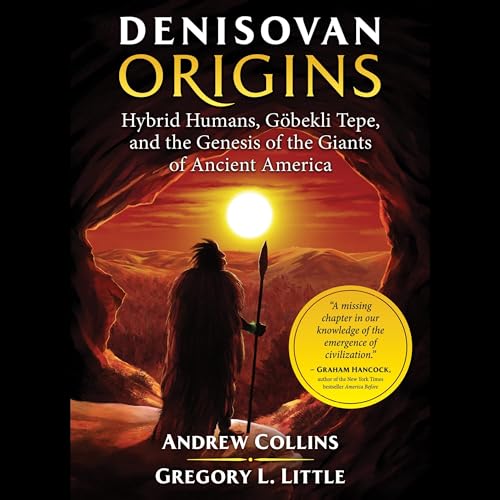
Denisovan Origins
Hybrid Humans, Göbekli Tepe, and the Genesis of the Giants of Ancient America
No se pudo agregar al carrito
Solo puedes tener X títulos en el carrito para realizar el pago.
Add to Cart failed.
Por favor prueba de nuevo más tarde
Error al Agregar a Lista de Deseos.
Por favor prueba de nuevo más tarde
Error al eliminar de la lista de deseos.
Por favor prueba de nuevo más tarde
Error al añadir a tu biblioteca
Por favor intenta de nuevo
Error al seguir el podcast
Intenta nuevamente
Error al dejar de seguir el podcast
Intenta nuevamente
 Exclusivo para miembros Prime: ¿Nuevo en Audible? Obtén 2 audiolibros gratis con tu prueba.
Exclusivo para miembros Prime: ¿Nuevo en Audible? Obtén 2 audiolibros gratis con tu prueba.
Elige 1 audiolibro al mes de nuestra inigualable colección.
Acceso ilimitado a nuestro catálogo de más de 150,000 audiolibros y podcasts.
Accede a ofertas y descuentos exclusivos.
Premium Plus se renueva automáticamente por $14.95 al mes después de 30 días. Cancela en cualquier momento.
Compra ahora por $5.99
-
Narrado por:
-
Micah Hanks
• Traces the migrations of the sophisticated Denisovans and their interbreeding with Neanderthals and early human populations more than 40,000 years ago
• Shows how Denisovan hybrids became the elite of ancient societies, including the Adena mound-building culture
• Explores the Denisovans’ extraordinary advances, including precision-machined stone tools and jewelry, tailored clothing, and celestially-aligned architecture
Ice-age cave artists, the builders at Göbekli Tepe, and the mound-builders of North America all share a common ancestry in the Solutreans, Neanderthal-human hybrids of immense sophistication, who dominated southwest Europe before reaching North America 20,000 years ago. Yet, even before the Solutreans, the American continent was home to a powerful population of enormous stature, giants remembered in Native American legend as the Thunder People. New research shows they were hybrid descendants of an extinct human group known as the Denisovans, whose existence has now been confirmed from fossil remains found in a cave in the Altai region of Siberia.
Tracing the migrations of the Denisovans and their interbreeding with Neanderthals and early human populations in Asia, Europe, Australia, and the Americas, Andrew Collins and Greg Little explore how the new mental capabilities of the Denisovan-Neanderthal and Denisovan-human hybrids greatly accelerated the flowering of human civilization over 40,000 years ago. They show how the Denisovans displayed sophisticated advances, including precision-machined stone tools and jewelry, tailored clothing, celestially-aligned architecture, and horse domestication. Examining evidence from ancient America, the authors reveal how Denisovan hybrids became the elite of the Adena mound-building culture, explaining the giant skeletons found in Native American burial mounds. The authors also explore how the Denisovans’ descendants were the creators of a cosmological death journey and viewed the Milky Way as the Path of Souls.
Revealing the impact of the Denisovans upon every part of the world, the authors show that, without early man’s hybridization with Denisovans, Neanderthals, and other yet-to-be-discovered hominid populations, the modern world as we know it would not exist.
Los oyentes también disfrutaron:




















Reseñas de la Crítica
“Collins and Little are the perfect team to address one of humanity’s greatest enigmas. . . . From giant skeletons to the mysterious mound builders of ancient America, this team assembles the lost pieces of the human time line.”
“Andrew Collins and Greg Little are two of the most respected writers in the ancient mysteries subject. They team up to provide a comprehensive account of the enigmatic Denisovans and their impact on the emergence of modern human society. If they are correct in their findings, as I very much suspect they are, then they have discovered a missing chapter in our knowledge of the emergence of civilization, both in the ancient world and--as I put forward in my own book America Before--in the Americas.”
Las personas que vieron esto también vieron:


















Thanks for the questions.
Se ha producido un error. Vuelve a intentarlo dentro de unos minutos.
Interesting
Se ha producido un error. Vuelve a intentarlo dentro de unos minutos.
Refreshingly comprehensive
Se ha producido un error. Vuelve a intentarlo dentro de unos minutos.
There was more before you ...
Se ha producido un error. Vuelve a intentarlo dentro de unos minutos.
Lots and lots of well-researched information regarding the history of humanity and excellent information on The Americas which I hadn’t heard before.
Intense, amazing
Se ha producido un error. Vuelve a intentarlo dentro de unos minutos.


